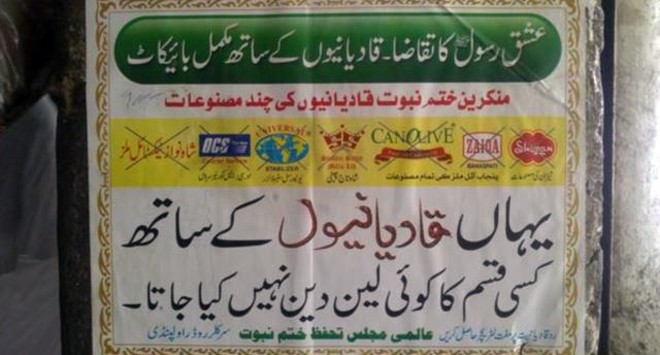
The community is discriminated against while applying for public documents or seeking admission in colleges

On May 12 this year, Ghulam Ahmed, a small farmer from the Ahmadiya community in Sharqpur, a village in Punjab, visited a neighbourhood shop, where he sighted a sticker denouncing business dealings with Ahmadis.
Ahmed complained to the shopkeeper and that led to a brawl.
After provocation by a cleric of the local mosque, the brawl ended in a blasphemy case against some Ahmadi community members. The episode ended with the killing of 65-year-old Khalil Ahmed by a teenager inside the police station.
Ahmadis face discrimination in their day-to-day life. It is increasingly becoming common for shops to have stickers saying Ahmadis are not welcome as customers. They face discrimination in getting admission in educational institutions and in many areas, Ahmadis are not allowed to buy properties. They are barred from burying their dead in common graveyards. In some cases, graves are exhumed and bodies shifted to another graveyard.
Discrimination against Ahmadis has been institutionalised after anti-Ahmadi legislations in 1974 and 1984.
In December 2012, over 100 tombstones were desecrated by unidentified men at an Ahmadi graveyard in the Model Town area of Lahore.
Similar incidents were reported a few months ago in Faisalabad and Lodhran.
Further, there are informal restrictions on community members in getting admissions in various colleges, especially medical colleges. There is a special section in the passport form, requiring people to prove they are Muslims, and that the Ahmadi leader is an imposter and his followers non-Muslims.
Secondary and intermediate level public examination forms in Punjab ask students about their religious affiliations as well. Mobarak Haider, a notable writer with focus on Muslim history, says, "The Ahmadi view of prophethood is a strongly disputed view because the Muslims have believed for all these 12 centuries that there can be no Prophet after Muhammad (PBUH) and when a group claims they believe in another prophet the issue becomes difficult to resolve."
Haider believes that in this context, "extremist elements among the Muslims who do not believe in debate and intellectual discourse find their emotional outburst easier to show and some of them who are malicious or agent provocateurs take the benefit of this emotional situation and go to the extreme, which our faith does not allow, like burning properties, killing people or plundering of property and so on."
In recent years, there have been reported attempts in England, Germany, Denmark and Canada by extremist Islamic groups, trying to institutionalise discrimination against the Ahmadiya community. But the laws of the land ensure action against the perpetrators to guarantee human rights, peace and freedom.
"To end violence and discriminatory attitude, you have to implement laws. The law does not provide that one will not let others give burial to their loved ones or the graves will be dug or one can be stopped praying or giving Arab names to their children," says Haider.
To stop this discrimination, Haider says, we have to understand its reason. "The reason is we have authorised the clergy to do whatever they want. The people who rule Pakistan believe they have the best weapon in the shape of the clergy and they increase the clergy’s authority to manipulate their power."